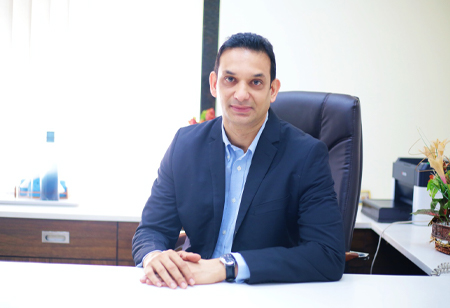
Indian Medical Tourism Market and How it is Fared Post Pandemic


Abrarali Dalal, Director and CEO, Sahyadri Group of Hospitals, 0
Indian medical tourism has been a cornerstone of the global healthcare market. Medical tourism in India is known for its cost-effective, high-quality medical care and the availability of advanced treatments at much lower and affordable rates. The sector, renowned for its advanced treatments and alternative therapies such as Ayurveda, has historically attracted a diverse international clientele, including a good set of patients from Southeast Asia, the Middle East, Africa, and Western nations. India was well-known before the pandemic as a leading location for a variety of medical requirements, from complicated surgery to elective procedures. However, the COVID-19 pandemic brought with it enormous difficulties, as travel restrictions and the temporary stoppage of elective surgeries severely affected the flow of international patients.
Post-Pandemic Scenario in Indian Medical Tourism
Recovery and Current Trends - As the world transitions into the post-pandemic era, Indian medical tourism is witnessing a notable resurgence. This revival is driven by the accumulated demand during the covid pandemic when many non-urgent treatments were deferred. Now, as travel around the globe resumes, there has been a significant uptick in patients arriving in India, particularly for specialties like cardiology, orthopedics, transplants, and various elective surgeries. These areas not only offer cost savings but are also recognized for their superior clinical outcomes, rivaling those available in Western countries.
Technological Advancements - The Indian healthcare industry has seen a radical transformation thanks to technological integration. Telemedicine has become an indispensable instrument, enabling preliminary consultations with experts, considerably mitigating the anxieties of foreign patients before their journey. Additionally, the treatment process has been expedited by the use of AI-driven diagnostics and digital health
records, improving the efficacy and efficiency of medical care delivered in Indian hospitals.
Government Initiatives and Policy Support - The role of the Indian government is pivotal in the sustained growth of medical tourism. There is a pressing need for a structured policy environment that supports the sector. Key initiatives could include developing a transparent system that directs medical tourists towards specialized centers of excellence. Such centers would be distinguished not only by their specialization but also by their proven track records in achieving exceptional clinical outcomes. Additionally, the government bodies could also work on enhancing the overall medical tourism infrastructure, which includes regulating treatment costs and minimizing the role of intermediaries, thus making treatments even more affordable for international patients.
Focus on Comprehensive Care - India’s advantage also lies in its unique offerings of holistic and alternative therapies, including Ayurveda and yoga, which appeal to those seeking not just medical treatment but also wellness therapies aimed at enhancing overall health. Post-pandemic, there is a growing global trend towards such holistic health solutions, and India is well-positioned to cater to this demand.
Challenges and Opportunities - Despite the optimistic recovery trajectory, the healthcare sector faces challenges such as unpredictable travel policies and geopolitical tensions, which can affect international patient inflows. Economic instability in key target markets also poses a risk. However, these challenges present opportunities for further innovation in healthcare delivery and patient care management, allowing India to adapt and enhance its medical tourism offerings continually.
With predictions for strong development fueled by the integration of cutting-edge healthcare facilities, a qualified medical workforce, and ongoing affordability, the future of medical tourism in India looks bright. India must take strategic steps to improve patient experiences and integrate cutting-edge technologies if it hopes to preserve and grow its standing as the world's leader in medical tourism.
The post-pandemic recovery of India's medical tourism industry demonstrates the industry's adaptability and durability. India is poised to solidify its position as a global leader in healthcare by delivering first-rate medical services, state-of-the-art technology, and all-encompassing patient care.
India is poised to solidify its position as a global leader in healthcare by delivering first-rate medical services, state-of-the-art technology, and all-encompassing patient care
Government Initiatives and Policy Support - The role of the Indian government is pivotal in the sustained growth of medical tourism. There is a pressing need for a structured policy environment that supports the sector. Key initiatives could include developing a transparent system that directs medical tourists towards specialized centers of excellence. Such centers would be distinguished not only by their specialization but also by their proven track records in achieving exceptional clinical outcomes. Additionally, the government bodies could also work on enhancing the overall medical tourism infrastructure, which includes regulating treatment costs and minimizing the role of intermediaries, thus making treatments even more affordable for international patients.
Focus on Comprehensive Care - India’s advantage also lies in its unique offerings of holistic and alternative therapies, including Ayurveda and yoga, which appeal to those seeking not just medical treatment but also wellness therapies aimed at enhancing overall health. Post-pandemic, there is a growing global trend towards such holistic health solutions, and India is well-positioned to cater to this demand.
Challenges and Opportunities - Despite the optimistic recovery trajectory, the healthcare sector faces challenges such as unpredictable travel policies and geopolitical tensions, which can affect international patient inflows. Economic instability in key target markets also poses a risk. However, these challenges present opportunities for further innovation in healthcare delivery and patient care management, allowing India to adapt and enhance its medical tourism offerings continually.
With predictions for strong development fueled by the integration of cutting-edge healthcare facilities, a qualified medical workforce, and ongoing affordability, the future of medical tourism in India looks bright. India must take strategic steps to improve patient experiences and integrate cutting-edge technologies if it hopes to preserve and grow its standing as the world's leader in medical tourism.
The post-pandemic recovery of India's medical tourism industry demonstrates the industry's adaptability and durability. India is poised to solidify its position as a global leader in healthcare by delivering first-rate medical services, state-of-the-art technology, and all-encompassing patient care.